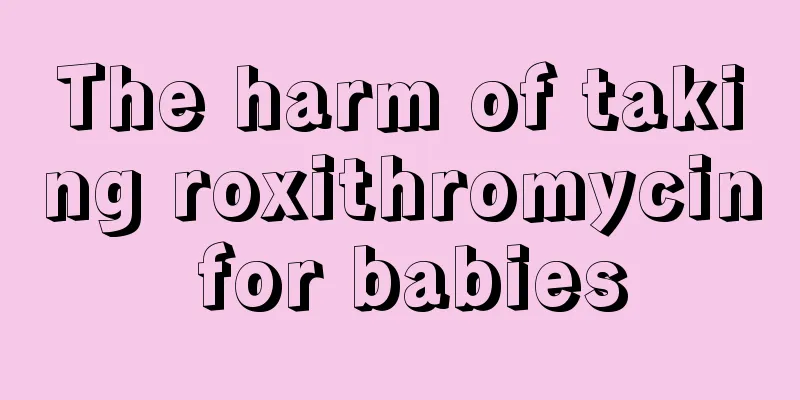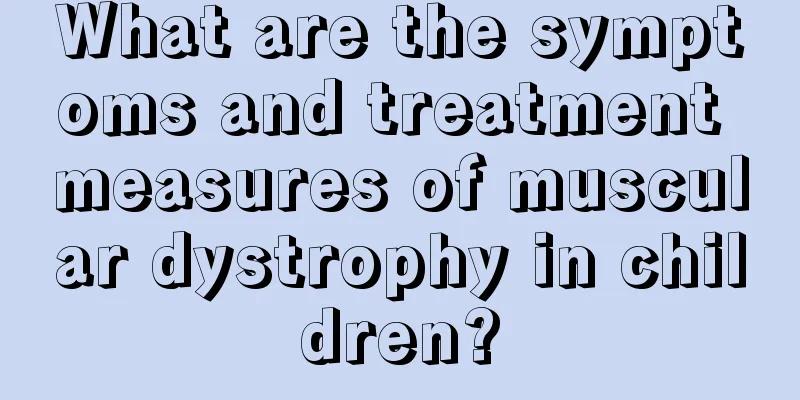What are the treatments for hyperthyroidism in babies?

|
Common diseases that babies suffer from are usually colds, fevers, diarrhea, etc., while hyperthyroidism is a disease that is not easy to occur in babies. However, once the disease occurs, it will harm the baby's thyroid function, so the disease must be discovered in time. Parents should always observe their baby's physical condition. If there is any abnormality or it cannot be diagnosed, they should take their children to the hospital for examination. After the disease is confirmed, relevant treatment can be carried out. So what are the treatments for hyperthyroidism in babies? The treatment of hyperthyroidism in children is different from that in adults. Among oral medication, surgical resection and radionuclide iodine treatment, oral medication is the first choice. Oral treatment generally requires 2 to 3 years; those caused by Hashimoto's disease can be shortened. The choice of therapy should be based on the child's age, course of disease, type of hyperthyroidism, size of the thyroid gland, drug response, presence of Hashimoto's disease, and whether the parents can adhere to treatment. Surgery or radionuclide iodine therapy should be considered only when medical treatment is ineffective. 1. General treatment Students should take a rest during illness and can be exempted from physical education classes. Avoid external stimulation and pressure, and the diet should be rich in protein, carbohydrates, vitamins, etc. 2. Methimazole (also known as methimazole) This drug can inhibit the combination of iodine and tyrosine and inhibit the synthesis of thyroid hormones. It takes effect quickly and lasts a long time after oral administration (half-life is 6 to 8 hours). After 1 to 3 months of medication, the condition is basically under control, the heart rate drops to 80 to 90 beats/min, and blood T3 and T4 also drop to normal. The dosage can be reduced by 1/3 to 1/2. If it is still stable, gradually reduce to the maintenance dose. Generally, it is appropriate to use the drug for 2 to 3 years. A small number of children may develop temporary leukopenia or rash after taking the medicine, which disappears as soon as the medicine is stopped. In severe cases, granulocytopenia, liver damage, glomerulonephritis and vasculitis may occur. Although these are rare, careful observation is still required during use. Agranulocytosis often occurs in the first few weeks or months of medication, often accompanied by fever. Therefore, blood routine tests should be checked frequently during the initial treatment. If the white blood cell count is lower than 4×109/L, antithyroid drugs should be reduced or stopped, and white blood cell-raising drugs (such as shark liver alcohol, reserpine, moraspomicin, etc.) should be given to treat the rash. Generally, the condition can be improved through treatment with anti-allergic drugs such as diphenhydramine, chlorpheniramine (chlorpheniramine), astemizole (assetamine), etc. For severe rashes, glucocorticoids can be tried. 3. Propylthiouracil (PTU) In addition to inhibiting the synthesis of thyroid hormones, it also reduces the conversion of T4 into T3 in peripheral tissues, and its toxicity is the same as that of methimazole. After being absorbed, propylthiouracil (PTU) mostly binds to proteins in the blood circulation and rarely passes through the placenta, so it will not harm the fetus. 4. Propranolol If the cardiovascular symptoms are obvious, the adrenergic receptor blocker propranolol (Inderal) can be added as an auxiliary drug to alleviate symptoms such as rapid heart rate, sweating, tremor, etc. caused by excessive excitement of the sympathetic nerves. 5. Thyroid powder (tablets) If hypothyroidism, thyroid enlargement or more obvious exophthalmos occurs during the treatment, thyroid powder should be added and the dosage of methimazole (thimazole) should be reduced as appropriate. 6. Surgery Thyroid surgery is indicated for patients with drug allergies, granulocytopenia, thyroid tumors, significantly enlarged thyroid gland that does not shrink significantly after taking medication, or recurrence of the disease after taking medication. Antithyroid drugs are used for 2 to 3 months before surgery to normalize thyroid function. Take iodine/potassium iodide (compound iodine solution) for 1 to 2 weeks before surgery to prevent intraoperative bleeding. From 4 days before surgery to 7 days after surgery, take propranolol (Inderal) orally once every 6 hours. The incidence of hypothyroidism after surgery is 50%, and a few cases experience temporary or permanent hypoparathyroidism. Hyperthyroidism in babies is extremely dangerous. Parents should take their children to the hospital for examination and receive correct treatment after the disease is confirmed. There are many ways to treat the disease. The article introduces the common treatments for the disease. The treatment method should be combined with the patient's condition. The cure rate is very high in the early stages and the harm to the patient will be reduced. At the same time, regular physical examinations can detect hidden diseases in the body and facilitate treatment. |
<<: What is good for baby food?
>>: What are the nutritious porridges for babies to strengthen their spleen and stomach?
Recommend
When is the feeding time for newborn baby?
Raising a baby is a very important thing. Many fi...
Some common sense about chlamydial pneumonia in children
Children's physical health is the most concer...
Symptoms of autistic children
Autism is a very common disease nowadays. There a...
What should children eat to supplement zinc? Recommended foods for zinc supplementation
Zinc deficiency in children will lead to symptoms...
What is the cause of baby squeezing eyes?
Blinking is a very normal phenomenon in our daily...
What food is good for students to nourish their brains?
During the critical period of learning and growth...
The reason why five-month-old babies are restless when sleeping
Many 5-month-old babies are restless when they sl...
Three-year-old baby vomits only with no other symptoms
When a three-year-old baby is young, his body is ...
What should I do if my child doesn’t want to sleep?
Parents often encounter a headache problem, that ...
What to do if your 2-month-old baby has less sleep time
Every family hopes that their baby can grow up he...
The child has repeated fever within one month
Nowadays, most colds are caused by bacteria. Babi...
What are the ways to lose weight through exercise for children?
Many children are prone to obesity due to various...
What to do if your child has a stuffy nose
Children will encounter various diseases as they ...
Solutions to zinc deficiency in four-month-old babies
Zinc deficiency in babies will affect their norma...
What causes dark circles under boys' eyes?
Nowadays, more and more people have dark circles ...









